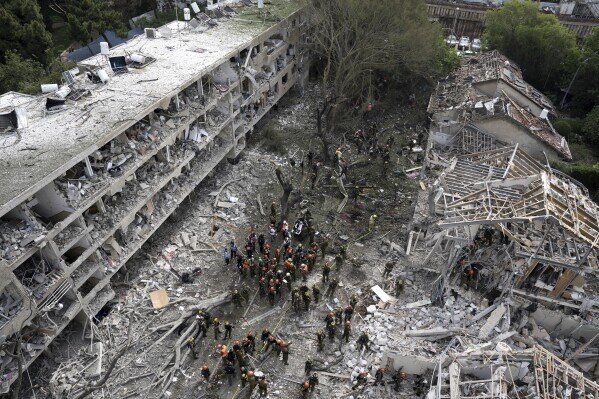The next Iran-Israel conflict could be a more intense ‘shadow war’

TEHRAN – In recent decades, the confrontation between Iran and Israel has evolved into a battleground of overt and covert hostilities—sometimes erupting into full-scale warfare, other times unfolding through discreet yet impactful operations.
Iran and Israel fought an all-out military confrontation between June 13 and June 24. Since the fighting halted, analysts have been trying to guess how and when the two sides would directly target each other with bombs and missiles again. But it also appears that the Iran-Israel conflict could once again revert to its previous pattern: the "shadow war." This model, dominant over the past two decades, has been defined by intelligence operations, sabotage, targeted assassinations, lobbying, diplomatic pressure, and proxy warfare.
In the early hours of June 13, 2025, after years of attempting to destabilize the Islamic Republic through internal unrest, intensified economic pressure, and lobbying for crippling sanctions, Israel launched a direct military strike against Iran, citing concerns over its nuclear program. Although the initial days of the war favored Tel Aviv, the tide began to shift once Iran regained its military footing—damaged earlier by the assassination of key commanders. Iran’s widespread missile retaliation, tactical shifts in its offensive strategy, domestic intelligence breakthroughs that exposed Mossad-linked groups, and the strain on Israel’s missile defense reserves helped recalibrate the balance of power. This dynamic continued until Iran deployed its newer-generation missiles, prompting Tel Aviv to request a ceasefire.
More than two months after the end of the 12-day war, while the possibility of renewed conflict cannot be ruled out, a return to the old pattern of confrontation—the "shadow war"—is emerging as a likely scenario. The war has effectively disproven a long-standing notion dating back to the 2003 U.S. invasion of Iraq: that “regime change” in Iran could be achieved through military intervention. This idea, long circulated in American military circles, has now been decisively discredited. Western media analyses suggest that the Iran-Israel war not only failed to incite domestic unrest in Iran but also validated Zbigniew Brzezinski’s 2004 warning: “If Iran is subjected to external pressure or military attack, Iranian nationalism will fuse with Shiite beliefs, creating an explosive force.” This phenomenon was clearly observable throughout the 12-day conflict.
Israel had three primary objectives in launching its offensive against Iran: inflicting extensive damage on nuclear and military infrastructure, assassinating high-ranking Iranian officials, and steering the country toward chaos—ultimately aiming for regime change. While it managed to damage some nuclear facilities with U.S. support, Iran’s military capabilities and social cohesion remained largely intact. On the other hand, Iran’s strategic use of missile tactics and deployment of its advanced arsenal helped restore a degree of military balance and inflicted significant damage on Israel.
It’s also crucial to remember that surprise has always been a cornerstone of warfare. Yet today, Iran’s enhanced military preparedness and reconstruction of its defense systems—including air defense—have dramatically increased the cost of any direct Israeli attack. Recent changes in the structure of Iran’s Supreme National Security Council further signal Tehran’s commitment to crisis management and strategic planning in the face of future threats. Meanwhile, Israel has not succeeded in halting Iran’s nuclear program; by its own admission, it has only managed to delay it by a few years. This reality, coupled with the protracted and inconclusive conflict in Gaza—now nearing two years—has drained Tel Aviv’s military and political stamina, making any extended campaign against Iran increasingly difficult.
One must also consider the economic dimension. Economies are driven by the decisions of people—consumers and businesses. Anything that undermines consumer confidence or what John Maynard Keynes called “animal spirits” leads to higher costs and reduced investment. Rising tensions in the region make both citizens and investors more cautious. If everyone becomes cautious at once, the economy falters. While this may not be a critical issue for Iran, which has long endured Western sanctions and diminished foreign investment, it poses a serious threat to Israel.
Another enduring feature of the global economy is that when the world feels dangerous, investors flock to U.S. Treasury bonds. As we’ve seen, concerns over West Asia tensions are likely to temper recent increases in Treasury yields—and may even push them lower.
Any Israeli military strike on Iran has always been costly and risky due to geographic distance and Tehran’s deterrent capabilities. Now, with Israel fatigued from its prolonged war in Gaza, having failed to achieve strategic goals and facing mounting internal and international pressure, it seems poised to return to the lower-cost, potentially more effective model of the "shadow war." In this model, assassinations, covert operations, economic warfare, and disruptive diplomacy replace direct confrontation. This return is not driven by preference, but by necessity—because Tel Aviv knows that open conflict with Iran will not yield a swift victory and could spiral into an irreversible crisis for itself.
Leave a Comment